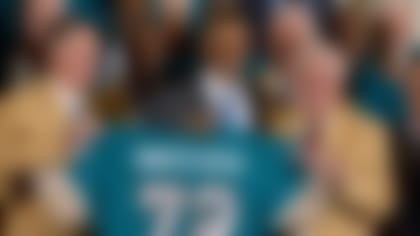Fifty years ago, the Dolphins won every game they played. But the NFL's first perfect season didn't just fall into place. Those who were there remember, in their words, the hard work, heroic efforts and twists of fate that marked Miami's path to the history books.
By Cameron Wolfe | August 25, 2022
Some of the most common imagery that has followed the 1972 Miami Dolphins actually stems from a folk tale. Those big champagne-toast gatherings you've probably heard about to celebrate the first loss of the final undefeated team every year simply don't happen.
"People believe in what they want to believe in," said Mercury Morris, one of the running backs on that Dolphins team. "But it didn't happen. I'll toast to that."
According to safety Dick Anderson, the truth dates back to late November 1991, when an 11-0 Washington team fell to the Dallas Cowboys, guaranteeing the '72 Dolphins would remain, for another season -- the 19th, at the time -- the only team in 国产外流网history to have a perfect season.
Three Dolphins legends -- Anderson, quarterback Bob Griese and linebacker Nick Buoniconti -- lived on the same block in Coral Gables, Florida. They decided two days before the Washington-Dallas game that remaining the only residents of Perfectville was worth celebrating. So when Washington lost, they met in one of their driveways.
"I walked outside and brought a champagne bottle. The three of us -- Nick, Griese, myself -- met up, drank and clicked glasses. But the thing is, we did it just one time," Anderson said. "And it's been quite some time since we've done a champagne toast."
Griese added: "That was the only time we did it. We were just walking around the neighborhood. One guy had a glass, then two guys had a glass, then three guys had a glass."
Anderson remembers bringing a bottle of champagne to a Dolphins game in 1998 to celebrate with a handful of former teammates that the final undefeated team that year -- the Denver Broncos -- suffered its first loss. But nearly every year since, Anderson said, they mark those moments with family and make calls, texts or emails with teammates.
"My dad loved talking about that season, and he loved when people talked about it," said Dave Shula, receivers coach at Dartmouth and the son of late Dolphins head coach Don Shula. "But I often get asked what those parties were like when the last undefeated team lost? Well, they didn't happen."
Left tackle Doug Crusan added: "When the last team loses, I do bourbon at home. I don't drink champagne. I guess that breaks the tradition."
The reality is, only three players from that Dolphins team -- Anderson, Morris and guard Larry Little -- still live in Miami-Dade County. Only a few more live in South Florida. They have been spread out for decades, in places ranging from Alaska to Iowa to rural Georgia.
But in late October -- ahead of the Dolphins' showdown with the Pittsburgh Steelers on Sunday Night Football in Week 7 -- members of the team will reunite for a special 50th anniversary celebration. A toast to perfection.
The 1972 Miami Dolphins accomplished something that no one else has matched, winning every regular-season game on their schedule (there were 14 at the time) and all three playoff games, including Super Bowl VII. Before the spotlight shines on them again, I wanted to get an up-close view of what this team was and how it achieved the impossible. I talked with 20 people who either played on the team or were intimately familiar with it about the untold stories, the games that defined the campaign, the Hall of Fame coach, life after perfection and the other memories they will cherish.
'1971 just extended into 1972'
The Miami Dolphins franchise spent its first four seasons of existence, from 1966 to '69, in the AFL under head coach George Wilson, putting up four consecutive dreary losing records. In 1970, when the Dolphins moved to the NFL, they made a big splash by hiring Don Shula away from the Baltimore Colts -- a move that caused them to be docked their first-round pick in the 1971 国产外流网Draft for tampering.
Shula quickly breathed new life into the Dolphins. They made a seven-win improvement in 1970, reaching the playoffs as a 10-4 team. In 1971, they won the AFC East and advanced to Super Bowl VI, where they lost to the Dallas Cowboys, 24-3.
It was a remarkable turnaround for a franchise that had been a laughingstock across the league. With the help of director of player personnel Joe Thomas, then Bobby Beathard (who replaced Thomas in 1972), Shula put together a team that maximized its talent.
But Shula was not satisfied to be the runner-up in 1971. In fact, he was incensed. His players would feel his intensity every day in the next year.
Vern Den Herder, defensive end: Coach Shula, on the flight back to Miami the day after the Super Bowl loss to Dallas, went around to everyone in the plane and told [us] to remember how you feel today. Remember the pain. "Next year, we're not only going to the Super Bowl, but we're going to win it." That was our mantra from that moment through the next year.
Mercury Morris, running back: Our whole motivation was redemption. Don Shula put on the projector and made us watch that 1971 Super Bowl every day for what felt like a week. He said, "You see how sick you feel. Keep that feeling."

Larry Csonka, fullback: Shula had already asked a lot. We had gotten to the mountaintop, but he was asking us to up the ante. He reiterated that in training camp, saying we were going to use this as fuel to motivate us. We are going to treat every week like it's the Super Bowl. We had been going through two years of continuous s---. He was asking us to rededicate ourselves and sacrifice more. We looked around at each other like, "OK, if you say so." (Running back) Jim Kiick looked at me, winked and said, "Buckle up."
Bob Griese, quarterback: Shula said everybody talked all offseason about the '71 Super Bowl loss. They weren't talking about the wins we had to get there. He started throwing it back at us, about how bad we played in the Super Bowl. He said, "You can't waste opportunities like that." I said, "That was our first loss, that was your second loss. You had one in Baltimore (in Super Bowl III)."
Dave Shula, ball boy and son of Don Shula: Hanging over my dad's head was that he was 0-2 in Super Bowls. There was a sense of urgency.
Mercury Morris, running back: 1971 never ended, it just extended into 1972. It's like getting an F on a test, then getting an A; you average a C. There's more grounding in redemption than greatness.
Paul Warfield, wide receiver: The media around the country was saying [we] were just an old AFL team that got lucky on a Super Bowl run. That gave us the incentive to prove that we weren't just a "rinky-dink football team." The only goal -- and I mean the only goal -- was to get to the Super Bowl to prove that we were legitimate. We were so incentivized to get back. We never even thought about perfection until the end.
Tony Segreto, broadcaster with WTVJ in Miami, covering the Dolphins on daily basis: All the newspapers come out and say, "Shula can't win the big one." That pissed Shula off. There was commentary on what this meant for Shula's legacy. It wasn't just the Super Bowl loss. It was the beatdown.
The 'Old Man' to the rescue
The Dolphins began the season 4-0, with three relatively easy wins and a big scare against the Minnesota Vikings in Week 3. Miami was led by the three-headed rushing attack of Csonka, Morris and Kiick, as well as its "No-Name Defense," which was so called because of a lack of superstars.
Coming off back-to-back Pro Bowl seasons, Griese was one of the NFL's best quarterbacks. Even so, earlier that offseason, Shula made it a priority to claim 38-year-old quarterback Earl Morrall off waivers as Griese's backup. Shula had coached Morrall with the Baltimore Colts and valued him in the role. The waivers fee , but he had to convince owner Joe Robbie to pay Morrall's -- a huge number for a backup quarterback then.
In the first quarter of the Dolphins' Week 5 game vs. the San Diego Chargers, Shula's commitment to preparation paid off. When Griese suffered a gruesome-looking broken tibia and dislocated ankle, Morrall -- nicknamed "Old Man" by teammates -- was flung into action.
Several players told me they were sure the season was over, figuring Griese's injury was too big a hurdle to overcome. Instead, Morrall proceeded to lead the 国产外流网in passer rating and be named AFC Player of the Year. Crucially, he also kept Miami out of the loss column for the duration of his tenure.

Bob Griese, quarterback: I remember the play; a short drop, I threw the ball, followed through, and one of the defensive linemen fell about halfway through my leg -- broke my tibia and dislocated my ankle. I knew just then that I wasn't going to be back that year. They took me to the hospital and reduced it. Now I'm doing everything I can do to get healthy just to be a father for my kid -- not necessarily for that season.
Larry Csonka, fullback: I heard Bob Griese's leg break. I literally heard it crack. It was one of the most sickening moments I witnessed in my career. Hearing it and knowing we would be without him for a while was really tough.
Tim Robbie, offensive play-charter and son of late former owner Joe Robbie: It was shocking to see Griese carted off on a stretcher. But the thing about Earl Morrall [was], he was unflappable. Earl just buckled his chinstrap, didn't say a word and threw a few warm-up passes and went in. It was like no big deal for him. The fact that he played well the rest of that game and even after, when the focus was all on him. It resonated with everybody.
Doug Crusan, left tackle: Earl made it out to the huddle. We looked at each other like, "Oh my goodness." But Earl fit in perfectly. He had a great personality. We said to each other that whatever we had to do, we had to pick it up more with Earl. That feeling never went away.

Csonka: When Earl came in the huddle, he asked, "What do you think?" I said, "Earl, it doesn't matter what I think. It's what you think." He smiled at me and said, "I think we got them." From that point on, it was close, but somehow, some way, we were going to win. Earl the Pearl was everything we needed him to be -- throwing, running, coaching. He was quiet -- never said much in meetings, just the essence of resilient strength on the football field. I would tell him there's room behind the right tackle for me to run, and he'd say OK and run it over and over again. He was very cognizant of everybody's opinion.
Crusan: In the locker room, Earl had a rocking chair in the corner. The equipment manager got him a chair in the locker room. He sat in it, too. He was a good sport. We tried to keep him alive. We called him Pearl. He had been to five different teams and was nearly 40 years old. He was a calming presence.
Tony Segreto, broadcaster: Shula said, "Luck is when preparation meets opportunity." If that isn't the story of Earl Morrall.
Griese: There would be no undefeated season without Earl Morrall.
The close calls: Brushes with imperfection
Nearly every player I spoke to said they never planned perfection, rarely thought about it during the season and didn't realize its significance until long after they achieved the feat. But most of those players vividly remembered moments in the year when they were close to losing.
The 1972 Dolphins' season definitely wasn't a cakewalk, though critics will point to a .367 opponent winning percentage as saying otherwise. There were several episodes of adversity to overcome in close games, even beyond the injury to Griese. Some players admit a few lucky bounces, timely plays from unheralded heroes or friendly calls went their way.
Three games stood out more than the rest:
WEEK 3: Miami Dolphins 16, Minnesota Vikings 14
Oct. 1, 1972, at Metropolitan Stadium in Bloomington, Minnesota
Fronted by the legendary Purple People Eaters defensive line, the Vikings entered 1972 having led the 国产外流网in scoring defense and regular-season wins for three consecutive seasons.
Minnesota controlled the entire game, jumping ahead on a 56-yard touchdown pass from Fran Tarkenton five minutes into the first quarter. The Dolphins struggled offensively, but took their first and final lead with 88 seconds left in the game thanks to a Griese touchdown pass to tight end Jim Mandich.
But the end didn't come without controversy -- most notably in the form of a much-questioned fourth-quarter, fourth-down roughing-the-passer penalty on Vikings defensive lineman Bob Lurtsema that extended the Dolphins' final touchdown drive.
Bob Lurtsema, Vikings defensive lineman: I got a thank you card from (offensive linemen Bob) Kuechenberg and (Jim) Langer because I was the reason they went undefeated. I burned it. I should've kept it.
"One bad official call caused them to have an undefeated season." -- Bob Lurtsema
Lurtsema: It was a terrible call. It was fourth down late in the fourth quarter. Griese threw an incomplete pass to the tight end over the middle. I turned around to watch it fall incomplete. I put my fist up and said, "We won," and bumped Griese walking backward. Then I tripped over a yellow flag. I saw the flag and thought it was called against one of the [offensive linemen] holding me, like they had done all game. The referee said it was roughing the passer. I couldn't believe it.
Bob Griese, quarterback: We were behind the whole game up there. They had a good team, and a damn good defense. The play I remember the most was the last touchdown. We got down inside their 5-yard line. For us, inside the 5-yard line on first down is always a run play because of Csonka, and we had great run blockers. So I called a pass. It was the right call, though.
Griese: The play was 119-split delay. It's a fake to Csonka off the left end, then Mandich is over there blocking three counts, and he releases to the middle of the end zone, and he's wide open. Touchdown. Game.
Lurtsema: One bad official call caused them to have an undefeated season. The players won't even deny it. They'll just laugh about it. I laughed with Griese about it years later. I mean, what are you going to do -- how long can you cry?

WEEK 6: Miami Dolphins 24, Buffalo Bills 23
Oct. 22, 1972 at Orange Bowl in Miami, Florida
Larry Little, guard: We played Buffalo at home. Mercury fumbled the ball on the Buffalo sideline. We were behind. If they had instant replay, it would have been a fumble. They ruled on the field that he was down. So we got a little break.
Mercury Morris, running back: The Bills ... made the fatal mistake of thinking only one guy could block (defensive tackle) Manny Fernandez. They went to hand the ball off to Juice (O.J. Simpson). They turned around, and Manny jumped through the line so fast, he took the ball right out of the QB's hand. So we got the ball on the 10-yard line. And we went down to score and win.
PLAYOFFS, DIVISIONAL ROUND: Miami Dolphins 20, Cleveland Browns 14
Dec. 24, 1972 at Orange Bowl in Miami, Florida
Larry Csonka, fullback: The Browns game was our closest to losing. Charlie Babb -- a rookie who made a huge play, blocking a punt and returning it for a touchdown -- gave us life and made the difference in that game.
Manny Fernandez, defensive tackle: That was a battle. The defense held up pretty good. We had five interceptions. The offense went south on us. It reminded me of the Super Bowl the year before. The greatest rushing offense in the league couldn't get a yard. Hell of a run by Jimmy Kiick in the end to get us the win.
One step away: The AFC Championship Game
Many members of the 1972 Dolphins say the game that spawned their most vivid memories wasn't Super Bowl VII -- it was the AFC Championship Game against the Pittsburgh Steelers.
This game actually featured what might seem from the modern perspective to be an odd twist. Though the Dolphins had a better regular-season record (14-0) than the Steelers (11-3), the game was played in Pittsburgh. In the first four seasons after the AFL-国产外流网merger, from 1970 to '74, home playoff teams were determined by , not regular-season results, as is the case today. That year, it was the AFC Central, the Steelers' division, that had home-field advantage in the rotation.
The Steelers quickly jumped ahead 7-0 in the first quarter, while the Dolphins' offense struggled early. In search of a spark, punter Larry Seiple said, he called his own number on a fake punt run after recognizing a formation that Shula and assistant coach Carl Taseff pointed out on film. The fake stunned the Steelers, and Seiple gained 37 yards for a first down. Morrall hit Csonka shortly after for a passing touchdown to even the score.
Tied at 7 at halftime with the offense still sluggish, Shula made a big QB switch, bringing Griese off the bench to replace Morrall. It was a shocking call, because Shula -- despite some pressure from the media -- initially decided to stick with Morrall's hot hand, even with Griese saying he had been healthy enough to play for at least two or three weeks. But Shula had a plan.
Those two key decisions made the difference in a 21-17 win over a Steelers team that would, in the years that followed, build a dynasty in its own right.
Jack Ham, Steelers linebacker: I remember it was a balmy day. A lot warmer than usual on New Year's Eve. (Editor's note: The temperature was 58 degrees, .) We had the Immaculate Reception the week before. We were trying to get our feet back under us.
"Sometimes you fall in a pile of s--- and come out smelling like roses." -- Larry Seiple
Mel Blount, Steelers cornerback: It was almost like the Dolphins brought the weather with them. It was unheard of. The South Florida guys were expecting the worst, but it was the best weather of the winter that day. It was like everything went perfect for them.
Larry Seiple, punter: Don said we could take advantage of how they set up their punt wall. They rushed everybody to the left side, so there was only one person on the right side. Shula said he would call it when it was time. But when I saw it, I said, "Shoot I'm calling it." It took a lot of pressure off my shoulders to get [the first down]. Everybody was jumping excited. It brought some energy to the team.
Blount: The game-changing play was the fake punt. I was covering the gunner and was locked in on him. Our interior group would go back to set up the return. I'm sure they saw something on film. The crowd was screaming and hollering. We thought somebody had blocked the punt. Then we see the punter running down the side of the field. Just a crucial mistake.
Larry Csonka, fullback: Seiple was running right behind some of the Pittsburgh Steelers to set up the blocking wall. They were leading the way blocking for him. I remember standing down on the sideline and hearing the Steelers fans screaming, "Turn around."
Seiple: Sometimes you fall in a pile of s--- and come out smelling like roses.
Tony Segreto, broadcaster: Shula was big on making sure the momentum was in the right direction. Griese was clearly the better QB. There was a debate going into the AFC Championship Game that Griese should start. "Why isn't he starting?" But Earl had the hot hand. Internally, I think everybody knew what was going on. When he brought Griese on at halftime, it showed Shula's brilliance. It flipped the switch.
Bob Griese, quarterback: I was probably practicing as good as I ever had. The whole team knew I was ready to play. Coach Shula said that was the toughest call he ever had to make, to start Earl that game and then ultimately take Earl out to put me in at halftime. I had a strong arm at that point. I wasn't battered and bruised. I hadn't been hit in 10 weeks. I'm fresh. It wasn't a surprise when Coach put me in. He didn't tell me to be ready. But I was ready. I expected it. I think he knew I was ready before that. He wanted to give Earl a chance to take this thing as far as he could. But the main guy was ready and healthy.

Ham: Our strategy didn't change when they changed quarterbacks. The strength of that football team was the offensive line blocking for Larry Csonka, Mercury Morris and Jim Kiick. We had a lot of respect for them. We were playing stack over. I don't think any of us were comfortable with the defense. They took advantage of it.
Blount: I remember a swing pass to Csonka thrown to the flat, we were in a Cover 2 zone. I went up to hit Csonka and I ended up bouncing off him like a basketball off the floor. It ended up being a touchdown.
Ham: We didn't know how to win those sorts of games. The Dolphins knew how to win. The mental part of the game is what we learned.
Blount: We learned in the big games, you can't win by making mistakes. That's the one thing about Don Shula's team -- they were a well-oiled machine, marching down the field and carving up defenses. That game taught us a lot. It taught us how to win.
Super Bowl VII: 'We are the best team ever'
The Dolphins, who entered the Super Bowl with a 16-0 record, were actually against Washington (13-3 at that point). Dolphins defensive end Vern Den Herder, who combined with Bill Stanfill for a sack on the final play of the game, said they were well aware of the betting odds, which, he said, "lit a fire underneath us. We felt disrespected."
Most players and people I spoke to remember the crowd at the Los Angeles Memorial Coliseum being rather subdued for a Super Bowl. The game itself was rather subdued, too. The Dolphins jumped out to a 14-0 lead, with the only blemish coming from kicker Garo Yepremian on a play that has earned its own nickname: Garo's Gaffe.
Yepremian set up for a 42-yard field-goal try late in the fourth quarter that would have given Miami a 17-0 win to cap off a 17-0 season. It would have been the only shutout in Super Bowl history. But Yepremian kicked the ball too low, got it blocked, then picked it up and inexplicably attempted to throw it. The ball slipped out of his hand for a fumble, and he palmed it to Washington cornerback Mike Bass, who grabbed it out of the air and took it back to the crib for a touchdown. A few Dolphins players I spoke to remember being angry at the time, but they were eventually able to laugh at one of the most hilarious plays in Super Bowl history. Shula he watched the play at least 100 times.
Safety Jake Scott was named Super Bowl MVP after a two-interception performance; he remains just one of two safeties to ever win the award. The story of the game was the Dolphins' dominant defense, with Fernandez also making a strong case for the trophy. The scoreboard read, "The Dolphins are Super," and players carried Shula off the field on their shoulders. At that moment, it was just the Super Bowl win -- not perfection -- that mattered.
Mercury Morris, running back: After 16 straight games, they made us underdogs in the Super Bowl because they didn't think we could win all 17 games. We were underdogs in the mind of people who didn't get it. They forgot that we went through 1971 to build us to be ready for 1972.
Mike Bass, Washington cornerback: We were [ranked in the top three] in (scoring) defense that year. We were favored to win the game because of our defense. But unfortunately, our offense didn't play as well as we normally would play, because of the Dolphins' defense. We held the Dolphins to 14 points. Statistically, we should have won the game. But we did not. And no one remembers who finished second.
Larry Little, guard: We were a young football team. An unemotional team. They were the old legends, a rah-rah team. I knew there was no way we would lose that game.
Bob Griese, quarterback: I fell asleep on the bus to the Super Bowl. We had two weeks to prepare. I was confident. I called the plays. I don't remember how long the bus ride was, but I slept on the bus. It was a good nap. I should have done that more. We won the Super Bowl after.
Paul Warfield, wide receiver: The Super Bowl was not as close as the score indicated. We had complete control of the ballgame, doing the things that we did to get there. Well, until Garo's Gaffe.
Bass: I was the spy man on the field-goal block -- my job was to be laissez-faire after the ball was snapped, unless something unusual happened. Usually, you hear one thud; that means a field goal is kicked. I heard two thuds. I looked up at Garo and said, "Oh my God, he's going to pick up this football." I headed straight to Garo. I saw him tap the ball and then try to throw the ball. He didn't know s--- about throwing the football. ... He popped it up. I was in the right place I was supposed to be. I grabbed the ball and headed to the end zone. All I saw was Garo and the sidelines. I thought, I could not let that m-----f----- tackle me and become my legacy. So I swiped Garo's hands away, outran Earl Morrall and scored a touchdown. We didn't win, but I spoiled the 17-0 score.
Vern Den Herder, defensive end: I always think of the final play. Bill Stanfill was a split-second ahead of me in the process of taking (Washington quarterback) Billy Kilmer down, [and] Stanfill lost his helmet. So I came in to help finish the sack, and there was a threesome in a pile. Kilmer was underneath us. So Bill and I started to congratulate and slap each other. The referee had to remind us that Kilmer was underneath us and we had to let him up.
Manny Fernandez, defensive tackle: To be honest, I don't remember the end of the game. I don't remember the party after the game. I got a concussion the last 10 minutes of the game. I looked at my wife when I woke up in the morning and asked her, "How did we do?" I had no recollection of the whole evening. Watching the film later, it was like a flare pass.
Fernandez: The play was ... to (Washington running back) Larry Brown. I was the first one to get to him. He almost got free, and I was trying to get him down. Then Nick Buoniconti came in and tried to finish it, and his helmet speared me right in the temple. I got up on my feet. I was wobbly. I got up into the Redskins' huddle. Nick had to get me back into our huddle. ... It wasn't my first concussion. But I'm happy to say, nowadays, my mind is all good. I'm still recovering from other playing injuries -- nine back and three shoulder surgeries -- but my mind is good. And we had the greatest team of all time.

Little: Carl Taseff -- one of our assistant coaches -- wrote on the blackboard after the Super Bowl, "Perfect Season. The Best Team Ever." And he was right. We are the best team ever.
Larry Csonka, fullback: Jake Scott and Dick Anderson were so smart, they even gave Joe Namath fits. Later in the locker room after our Super Bowl VII win, Jake Scott turned to Howard Kindig and said, "I don't think any of us realizes what we've just done."
Dave Shula, son of Don Shula: My dad had a sense of relief that he finally got over the hurdle and he got the monkey off his back of being able to win the big one. Nobody at the time realized that 50 years later, no one would go undefeated, but we knew the best anybody could do was tie.
The pressure of perfection
No team in 国产外流网history has, as of yet, joined the 1972 Dolphins in Perfectville, and Morris believes that is largely due to the pressure that comes with trying to be perfect once you get close. Nowadays, when a team gets to 7-0 or 8-0, the talk of perfection begins.
Nearly every player spoken with for this piece said they did not plan or strive for perfection. Most of them believed it wasn't that special at the time, or they believed another team would eventually match the mark. But here we are, 50 years later, and no one else has.
How did the Dolphins deal with the pressure of going for perfection?
Larry Little, guard: It's like a pitcher throwing a no-hitter. He doesn't want anybody to talk to him about it.
Larry Csonka, fullback: The scary moments going into the playoffs, we knew the margin of error was even smaller. But Shula was even more on edge every week, and it was magnified. I thought his head was going to explode by the time we got to the Super Bowl. The day off after the game -- those 24 hours -- was the only enjoyable time throughout the season. The demand, the intensity from the coaches was grueling.
Manny Fernandez, defensive tackle: The perfect s--- was all media hype. The perfection s--- started in the playoffs. I couldn't stand it. I didn't want to talk about it. I hung up on [Edwin] Pope -- the Miami Herald sports reporter -- because he called me with the perfect talk.

Paul Warfield, wide receiver: People did not even talk about us being undefeated until we played the New York Giants for our 13th game. The New York media only picked up on it. The undefeated streak happened for us because people didn't realize until toward the end.
Tony Segreto, broadcaster: There's no question as the season went on, the players could see the significance of being undefeated. The pressure mounted as wins continued. They didn't want to be the one to make a mistake to cost them a loss. You could see and feel the intensity change. The pressure within the building changed. Coaches walked differently. Players tensed up in interviews. Publicly, they would say nothing changed. Privately, they would tell you, "This is different now with an undefeated record."
Csonka: Shula didn't want a game ball. Or Coach of the Year trophy. He wanted the Super Bowl trophy. He didn't strive for perfection, and he was probably the last one to think we could go undefeated. He was so attentive to all the details that it was hard to live with him. He was an irritated soul. He woke up irritated at 5:30 in the morning, and at 6:30 at night, he was still irritated. That was where the pressure came from. Not perfection. It was Shula.
The Don Shula effect
Shula is the winningest coach of all time, having collected 347 victories, including two Super Bowl titles, and four Coach of the Year trophies. Many consider Shula, who died in 2020 at age 90, the greatest coach ever. He was undoubtedly the leader of the 1972 Dolphins.
The men who played for Shula and spoke to me for this piece were unwavering in their praise of the late coach for his impact on the Dolphins, particularly in 1972. But through the perfect, there was also pain. Playing for Shula wasn't easy -- as many of the players so eloquently described -- but they all agreed it was worth it.
Mercury Morris, running back: With George Wilson, we would go swimming when it was too hot instead of practicing. With Don Shula, we never drank water for seven years. We practiced four times a day.
Larry Csonka, fullback: I resented him a lot for how hard he was on us. A lot of us chirped to each other that, "This is too much, we are out here too long, it's too hot." But it made us perfect. Only one team in the history of the 国产外流网made every play it had to make during the course of the season to obtain perfection. Once we experienced that in 1972, I never questioned him again.
Manny Fernandez, defensive tackle: Shula was never completely happy. Win or loss. If you won, he would focus on all the things you did wrong. But I was just such a fortunate person to be on that team at that time when Shula turned it around.
Tony Segreto, broadcaster: Shula was one of those coaches where his will became his team's will. He took a team of mostly ragamuffins. Csonka, Mercury, Warfield, Kiick, Griese were guys. But the offensive line was all castoffs. But [he] coached them up, made them play as a team; they played pranks on each other. They won.
Dave Shula, son of Don Shula: There was no pretense with him. He was the same way at work as home. He was very aware of the media -- what was being said on TV, the paper and the radio. I know he had the internal satisfaction of proving people wrong.
Paul Warfield, wide receiver: Don Shula is a great coach to turn around an expansion franchise instantly to a winner in one year's time. Then taking them to the ultimate top game and eventually winning it back-to-back (in Super Bowl VIII). To establish a mark that has stood for 50 years and stands the day we speak. Can it be equaled? That's for somebody to prove. But it hasn't been done in 50 years and counting. [The Dolphins went] from losers who were doubted by many to the biggest winners ever.
Morris: Don Shula wanted perfect plays. Everything, including getting out of the huddle on "break" together, had to be perfect. We couldn't accept anything else other than executing the plays perfectly.
Segreto: I went to every practice in 1972. Practices were about as boring as any school project you would ever have. You'd put yourself to sleep. It was, "We're going to do this until you don't do this wrong."
Csonka: Shula had a whole different approach -- he called "The Winning Edge." He wanted it to belong to us through intelligence. There were a lot of teams that were just as dedicated or physically talented or mentally prepared. But we were focused on the little things we could get an edge on. His thing was, different guys [step up] at different times. That was one of the smartest coaching staffs that has ever been put together. We were one of the highest-IQ teams in the history of the NFL.
Segreto: Shula was at Mass at 7 a.m. every morning, the same pew, ate the same thing; he was a man of such discipline. Almost to a fault. His greatest strength was his greatest weakness. They hated Shula during the week because of how he worked them. But once the game was over, they loved him more than their closest relative.
Cherished memories
With every great team, there are under-the-radar stories. One goal with this oral history was to uncover as many fun, unknown elements of the 1972 seasons as possible. Here are some of those:
Bob Griese, quarterback: Two of the offensive linemen -- Bob Kuechenberg, Jim Langer -- were sitting in the sauna or the hotel room with about two games to go at 12-0. Everybody is talking in the papers about it. They said, "You think we can go undefeated?" They said, "We gotta lose to one (team) to get rid of the jinx. To get them to stop talking about perfection. Which one are we going to lose [to]? The Giants? No. The Colts? We ain't going to lose that. Well, guess we have to go undefeated."
Vern Den Herder, defensive end: I was No. 86 my first year in Miami. When I showed up for my second season, in the locker was No. 83. I went to the equipment manager and said, "They have somebody else's jersey." He said, "No, that's your number." They gave No. 86 to Marlin Briscoe when they traded for him. And so they gave me 83. No money exchanged. No words exchanged. So that didn't give me much confidence about my status or importance on the team. But two people got injured, and they had no one but me. The last play that season was, Bill Stanfill and I sacked Billy Kilmer for the last play in the Super Bowl. Amazing how it worked out. And overall, I liked 83 better anyway.
Paul Warfield, wide receiver: When I got traded from Cleveland to Miami (in January of 1970), I was going from a playoff team to an expansion team from an inferior league. It was a devastating blow to me. I wasn't happy. I thought, "Why me? Why did I get traded here?" Everywhere I played, from high school, college, NFL, was being part of a winning franchise. But when I went to Miami, I was going to a losing team. Ten days after my trade, Don Shula got hired there. His name was big, and it got bigger. To see that transformation from loser to winner, it was an amazing experience. I wouldn't trade it for anything.
Larry Csonka, fullback: After we won the Super Bowl, I remember sitting in the locker room. I thought about how I got into football and how I quit. I had my junior high school assistant principal -- Mr. Larry Saltis -- stand up at my Hall of Fame induction, because he was the reason I got back into football. I hated getting knocked down. I figured I'd have more fun finding something to do at home on the farm. But I got in trouble with the police, and the judge turned me over to Mr. Saltis. He asked me why I quit football. I told him why. He said I didn't understand the game. He had me read a couple of books, then draw formations and diagram plays on the blackboard during study hall every day. It gave me the understanding of football in eighth grade. That's when I first learned how important intelligence was on the football field. That was a major turning point in my life that helped set up my football career.
Dick Anderson, safety: Bill Belichick used to watch our practices in the early '70s, leaning on the fence, as a young guy, with Don Shula yelling at guys. He saw how it was being done. He learned from him. He learned from (defensive coordinator) Bill Arnsparger, who was brilliant on defense. I never questioned a single call [Arnsparger] ever made. We had very little dissension on the team. Everybody had a job, and they did it. That comes from good coaching.
Larry Seiple, punter: I thought the '73 team was a better team than the '72 team. I thought we were more prepared for it. I thought we were closer together. Even with the two losses (in '73).
Tony Segreto, broadcaster: [The players and Shula] would run gassers after practice. The first couple of games, they'd joke about who is faster, give Shula a little s--- that his legs weren't fast enough. As the wins and significance of wins started to add up, the laughter stopped. You felt an intensity around the team pick up to another level. There was more pressure. Nick Buoniconti, I remember him running gassers bent over, nearly about to throw up near the end of the season. Just pushing themselves. "Kuech" and [Jim] Langer, too.
Csonka: Jim Kiick or Mercury Morris never imagined being anything other than No. 1 RB. They didn't like it, and Shula understood the fact that they didn't like it. Especially for Kiick, who was full-time before that year. But it was a personal sacrifice to make the team better. The fact that Jim Kiick and Mercury Morris liked each other, didn't resent each other, and never made it personal helped us win that year. They had a special relationship. We also had the most well-rehearsed offensive line I've ever been around. It was communication. Monte Clark, our offensive line coach, had honed them to such an educated state.
Manny Fernandez, defensive tackle: We didn't do it with smoke and mirrors. We did it with great players and coaches. Our worst players were better than some team's best players. They had your back, and you had to do your best to have their back. We would talk s--- to each other. But we didn't let anybody talk s--- about us.
Life after perfection
Football wasn't the end for many who were a part of this legendary team. Their intelligence separated them on the field, and it gave them a path to future success in retirement. Several players had more lucrative second careers after football.
Nick Buoniconti helped found the Miami Project to Cure Paralysis, which, , conducts "cutting-edge discovery, translational and clinical investigations targeting traumatic spinal cord and brain injury, and other neurological disorders." Anderson was elected to the Florida senate. Offensive lineman Ed Newman is a Florida judge. Csonka has appeared on the HBO series Ballers, co-hosted American Gladiators and has hosted multiple聽. Morris and Csonka are among those who have written books and become motivational speakers. Csonka's memoir, Head On, will be ; in it, he shares memories of his life, his career and the 1972 Dolphins. Several other players became coaches and commentators. Anderson and Fernandez earned six-figure salaries selling insurance.
Of the 47 players on the 1972 Dolphins active roster, 17 have died, including, among those mentioned in this story, Briscoe, Buoniconti, Kiick, Kuechenberg, Langer, Mandich, Morrall, Scott, Stanfill and Yepremian. All seven coaches on staff from the team (Don Shula, Bill Arnsparger, Carl Taseff, Howard Schnellenberger, Monte Clark, Tom Keane and Mike Scarry) have passed away, with Schnellenberger being the last in March 2021. Even the youngest living players from the team are now in their 70s.
All of the time passed and players and coaches lost only add significance to the 1972 Dolphins family reunions. Roughly every five years, the Dolphins organization has been bringing members of the '72 group together for a celebration at the team facility. The players love it. It's a time to catch up, exchanging laughs and recalling memories.
The 50th anniversary celebration, coming ahead of the Week 7 game between the Dolphins and Pittsburgh Steelers on Sunday Night Football, should be particularly special. The current Dolphins will wear throwback jerseys and a commemorative patch that night. They will also recognize members of the team as alumni captains at every home game throughout the season, one position group at a time.
With players growing older, the 50th anniversary will be an excellent opportunity to celebrate and revel in perfection -- a feeling only those few know.
Mercury Morris, running back: It's like walking on the moon. Only the person who has walked on the moon truly knows what it's like to do it, no matter how much he explains it. That's how it is living life after being the only perfect team.

Manny Fernandez, defensive tackle: The greatest part of being a [member of the] '72 Dolphins was my after-football career, in sales. It got me into a lot of doors. It was a great entree. In sales, the greatest thing is, it helped me get a lot of appointments. [The] title insurance business was good and set me up for retirement well. Everybody knew me; I made a lot of money and had a lot of fun doing it.
Dick Anderson, safety: It helped immensely from a business standpoint. I was working my insurance job on my days off during the season. I was a specialist selling a product called credit life insurance for people who have loans to people all over Florida. I would get into a bank, and people would recognize me. On Mondays, I'd call people and use what happened on Sunday in my pitch to sell the product.
Larry Seiple, punter: It made me recognizable. Being a punter, you don't get much recognition, but being part of the 1972 team, I get two to three football cards sent to my house every day to sign. I know they are going to put it on eBay and sell the thing. I still sign them, because my card is only worth like 28 cents.
Morris: When you're the $800 question on Jeopardy, you're a household name. That doesn't happen if you're not with the 1972 Dolphins.
Tim Robbie, son of Joe Robbie: My father referred to himself as the idiot who hired all the geniuses -- Shula and his staff, Joe Thomas, Bobby Beathard. That was one of his strengths -- identifying people to fill specific roles. Then let them do their job and don't look over their shoulders.
Anderson: Every five years, the Dolphins have brought us in. When somebody passes away, we circulate and talk to each other. When Don passed away, we joked he couldn't come and scream at us.
Seiple: I am very, very sorry for all those who will not be there for the 50th anniversary. There are quite a few of them. My heart goes out to those players and their families. We don't see each other every day. We see each other every five years. It hurts when we lose someone. It was something to get to see the players and families and wives develop. It's hard to take all the death. But it makes you cherish life even more.
'We weren't awarded s---'
Eight people associated with the 1972 team -- Bobby Beathard, Nick Buoniconti, Larry Csonka, Bob Griese, Jim Langer, Larry Little, Don Shula and Paul Warfield -- are in the Pro Football Hall of Fame. But most 1972 Dolphins legends say they've received more respect for their accomplishment in recent years than in the immediate seasons that followed.
As a team, the members of the '72 Dolphins receive a plethora of mentions and interview requests whenever anyone gets closer to matching their undefeated, Super Bowl-winning season. The closest thus far came in 2007, when the New England Patriots carried an 18-0 record into Super Bowl XLII, where they were favored by double-digit points over the New York Giants. When the Giants -- boosted by Eli Manning and a miraculous helmet catch by David Tyree -- recorded one of the biggest upsets in Super Bowl history, the 1972 Dolphins were once again alone in perfection.
In August 2013, President Barack Obama invited the 1972 Dolphins to the White House for a special championship celebration, since they didn't get to have one there when they won the title. A handful of players skipped the event for political reasons, but it was a special moment for those in attendance. Obama even jokingly admitted the '72 Dolphins were the greatest team of all-time, a designation he'd previously saved for his hometown 1985 Chicago Bears.
In 2019, a panel convened by the 国产外流网to identify the top 100 teams in history (in commemoration of the league's 100th season) No. 1.
Some players were surprised, some players felt validated. And then there were Csonka and Morris ...
Larry Csonka, fullback: We weren't awarded s---. We took it. I'm tired of people saying we were named or awarded the greatest team. We knew we were the greatest team. Nobody else has ever been perfect but us.
Mercury Morris, running back: It was a no-brainer to me. How could anyone else be No. 1 when we were the only team that didn't lose a game? People say the 1985 Bears could beat the 1972 Dolphins. How could the 1985 Bears beat the 1972 Dolphins if the 1985 Bears couldn't even beat the 1985 Dolphins?
Vern Den Herder, defensive end: I was surprised we were No. 1, because in the initial years after, we were more of an afterthought. We were understated. We didn't have the persona they were looking for. It was always another team that was more powerful. As years went on, they realized this was a bonafide team.
Manny Fernandez, defensive tackle: [Going undefeated is] kind of unique. But you wouldn't know it from listening to sportscasts from other cities who say we got lucky, it was an easy schedule or this team is better. We could've been undefeated if it wasn't for blah blah blah. You know what, I say, f--- 'em.
Morris: I went up to ESPN headquarters when the 2007 Patriots were 8-0. (ESPN analyst) Keyshawn Johnson told me, "If the Patriots go 19-0, they'd be better than you." I said, "Why?" He said, "That's two more wins than 17-0." I said, "What year were you born?" He said, "1972." I told him, "'You were s----ing on yourself when we went undefeated, and look at yourself, you haven't changed one bit." And guess what, the Patriots didn't do it.
Dick Anderson, safety: All you can do if another team goes perfect is shake your head and congratulate them. They have more games to do now. So it's harder. We had 17. Now it's [21, with a 17-game regular-season and up to four playoff games]. The closest was the Patriots back in 2008. 35 seconds away. We remember it well. We were sweating. And boy did we celebrate when they didn't get it.

Dave Shula, son of Don Shula: My dad was very proud of getting honored at the White House in 2013. He was thankful to the media for keeping it relevant and bringing it up. For them to get the spotlight with the president was one of his big joys. He really enjoyed that President Obama brought up the fact that the Dolphins were the only team to beat his 1985 Bears that year.
Tim Robbie, son of Joe Robbie: (Former Dolphins tight end) Marv Fleming deserves the credit for making the Super Bowl White House celebration happen. He started writing every administration. He would get a lot of, "We'll see" responses. Then he wrote to Obama, and his people said, "Let's do it." The recognition was unexpected. It was the best reunion we've had because of the significance of the White House visit.
Tony Segreto, broadcaster: You can take this group of 2022 Dolphins players and you can have them all in the room. Then you can have what's left of the 1972 Dolphins team. When those true Dolphins fans walk in, they will go to the 1972 team. They are the ones that would demand the autographs and pictures. They are true rock stars. They still are to this day. They're legends.
Follow on Twitter.
Editors: Ali Bhanpuri, Tom Blair, Brooke Cersosimo, Dan Parr
Illustration by: Albert Lee












